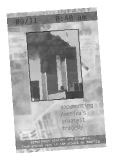9/11 8:48 AM: DOCUMENTING AMERICA’S GREATEST TRAGEDY
edited by Ethan Casey (Booksurge.com, $14.99 paperback/$6 e-book) “E-Publishing: What New Authors Need To Know” with Ethan Casey, Matt Briggs, Christine Macgenn, Jim Munroe, and Pete Rizzolo Hall Stage, 4-5:15 p.m.
ON MONDAY, OCT. 1, just three weeks after the world-shaking events of Sept. 11, the first book about it appeared. Titled 9/11 8:48 AM: Documenting America’s Greatest Tragedy, it was published by online publisher Booksurge.com and edited by Ethan Casey of Seattle’s BlueEar.com, an online publication devoted to travel writing. The book is available both in stores and online (www.booksurge.com and www.powells.com), with proceeds going to the Red Cross.
Reaching Casey by phone in London, where he was visiting, we asked him about the point and process of putting out an instant book. He started by recounting how Booksurge co-founder Mitchell Davis called him a few days after the terrorist attacks and asked if he could have an 80,000-word manuscript ready in 10 days.
Seattle Weekly: Why did Booksurge want the book completed so quickly?
Ethan Casey: I think they felt that if a book was out there with net profits being donated to the Red Cross, it could be practically useful. I think they also wanted to prove that this kind of thing could be done.
There are innovative and almost revolutionary things we’re doing in terms of marketing this book. It’s being sold outside the established channels of how bookstores typically buy books. Instead of going through the largest, most prominent wholesaler in the industry—I don’t want to name names—Booksurge is able to sell the book directly to stores. Because of the topic and topicality of the book, stores are proving quite willing to deal directly with Booksurge.
How did you manage to do it in that time?
Beginning on the 11th, the BlueEar forum, like many other discussion lists, started erupting with some really extraordinary, gut-wrenching, heartfelt firsthand accounts. So when Mitchell phoned me, I knew we already had a base for the book.
A second category of contributors answered a call that the Booksurge people and I sent out. We just got flooded in a matter of days. And there’s an interesting mix of professional writers and nonprofessional, just sort of ordinary office workers or housewives. The third category of writers is faculty and students affiliated with the New York University department of journalism.
So you got your pieces ready by . . . ?
Saturday, the 29th of Sept. I e-mailed a 400-plus page Word document to Booksurge. And over that weekend, they turned that Word document into a PDF file and printed it.
You usually think of a book as being much more reflective than newspapers and ongoing coverage. What were you trying to do with this book?
It’s a book of its moment, but it’s a book that gives a very wide range of different, and often opposing, voices. And precisely by being of its moment, it will, I believe, have a lasting value, because people are going to want to continue to refer back to what this moment was like.
Tell me about the different voices.
The second piece in the book is by a guy who was in a parking garage under one of the towers—Peter Wong, an executive with the Singaporean bank. It was very much, “This is what I saw, I had to run up this escalator, I had to go through the hotel lobby, thank you to the lady who gave me the sandwich.” Actually, quite a gripping piece. The original vision was that there would be much more of that kind of thing in the book, but I wanted to get a perspective that was a little further away as you get into the book.
So the first section is all eyewitness accounts. The second section is people in New York and Washington in the aftermath, in the week or so following Sept. 11. The third section is from people around America and around the world. There’s a guy named Brian Calvert who’s a reporter for the Cambodia Daily, and he wrote a really moving piece about a young Cambodian girl who asked him if his family was all right in America. And then he reflects in his piece about how ironic it is that an American would be accepting pity from a Cambodian.








